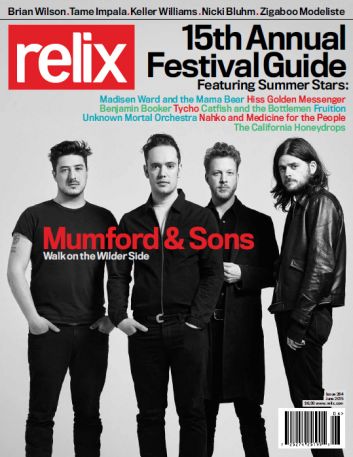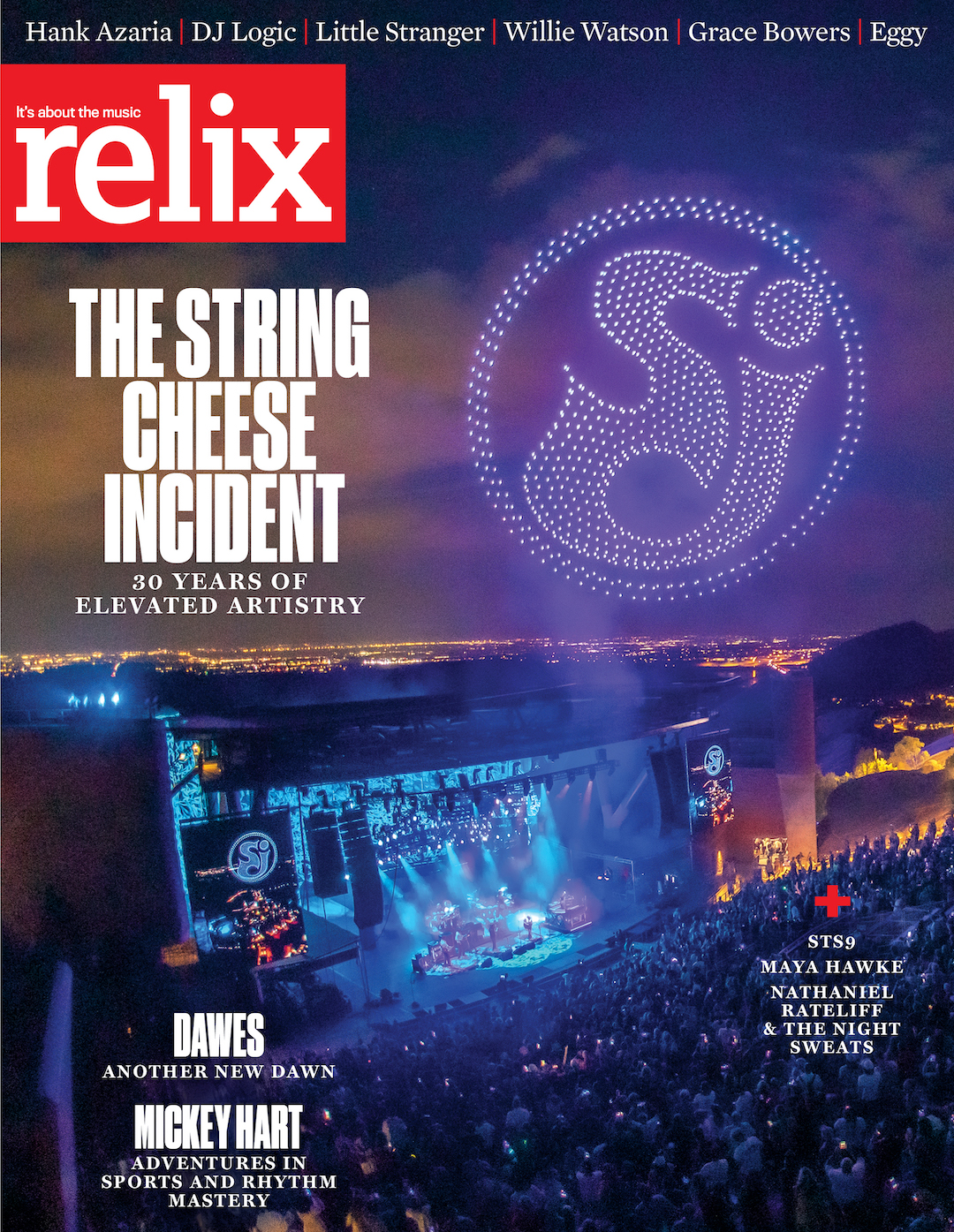Mumford & Sons: _Wilder_ at Heart

Though Greenwich Village’s Le Poisson Rouge only opened its doors in 2008, the building’s musical history runs surprisingly deep. From 1958-1993, 158 Bleecker Street—the space that currently houses LPR—was home to The Village Gate. During its heyday, the venue featured performances from legendary artists ranging from John Coltrane, Miles Davis and Billie Holiday to Dave Van Ronk, Odetta and Pete Seeger, the last of who delivered the venue’s opening performance. It was a pillar of New York’s jazz, folk and blues communities during the ‘60s.
If Mumford & Sons—often cited as the catalyst for folk music’s reemergence in mainstream music over the last five years—had appeared here 18 months ago, then the assumption would have been that their performance, regardless of whether the band knew the venue’s history or not, was a homage to The Village Gate’s storied past.
Tonight, however, there will be no folk music for Mumford & Sons fans, some of who have lined up hours before the doors open to see a band that typically headlines arenas and large festivals. As they have in small clubs in London, Berlin, Los Angeles and Toronto preceding LPR, the band will play music entirely from their new album Wilder Mind. For the 300 people in attendance, folk will be replaced entirely by another four-letter word this evening: rock.
***
In the wake of their 2009 debut Sigh No More‘s unbridled multiplatinum success, led by the foot-stomping, barnburners “Little Lion Man” and “The Cave,” Mumford & Sons once again turned to producer Markus Draves for their sophomore effort, Babel. The hallmarks that enthralled fans returned at similar or amplified levels: banjo, acoustic guitar, Marcus Mumford’s sweet guttural howl, the quiet-loud moments that burst with exuberance and lyrics that sound like they were written by a tipsy man whose broken heart had left him in a spiritual crisis.
When Mumford & Sons sat for a previous Relix cover story in August of 2012, Babel was still more than a month away from its release. The singles “I Will Wait,” “Lover of the Light” and “Whispers in the Dark” were beginning to make their way into the band’s live sets that, up to that point, were essentially comprised of Sigh No More with some covers and B-sides thrown in.
Spending time with Mumford & Sons at the Gentlemen of the Road Stopover in Bristol, Va., for that story, it was easy to feel their artistic restlessness. At the time, keyboardist Ben Lovett said, “I could totally see a Mumford & Sons record without banjo, but we couldn’t imagine this record without banjo, in the same way we couldn’t imagine the next record without Marcus’ vocals throughout, but we’ll see how much legs we’ve got on us. It’s a balancing act; we don’t want to confuse people. There’s a sonic familiarity with Mumford & Sons that we don’t want to fuck with too much.”
The banjo, at that point, was a defining instrument for the band. However, Winston Marshall says he would have happily traded it for an electric guitar if the collection of songs that came to encompass Babel didn’t compel him to use that particular string instrument.
The members were profoundly happy about the fact that their meteoric rise in popularity was allowing them to tour the world in a way that gave them immense pleasure. As travel junkies, they typically seek experience over comfort when it comes to understanding a city or a country. It’s not about the destination for them; it’s about the journey and the people they come in contact with along the way.
Thus, the group wanted to ensure that the fanbase that was affording them these wonderful opportunities warmly received Babel—any band that breaks as big as Mumford & Sons did feels that pressure for a sophomore record. Inherent to Lovett’s point, the group consciously restricted themselves to a particular set of instrumentation for the record. However, if Sigh No More hadn’t sold five million units, then the foursome might have tinkered with their formula more radically than they did on Babel.
These creatively restless musicians, who had already toured for four years straight on one album’s worth of material, eventually experienced some anxiety about touring in support of that second album within a fairly confined sonic space.
“We probably toured a year longer than we intended to,” Mumford reflects on the Babel tour, which ended in September 2013, while in New York this past April. The singer recently tore a ligament in his left knee playing soccer, and has propped his leg up on a coffee table as he sits on a couch in a large flat that’s been rented for the band’s press opportunities. He’s wearing leather boat shoes, black jeans and a faded blue button-down with the sleeves rolled up. Occasionally, there’s a flash of silver from the oval belt buckle stamped with an M in the middle. “That’s just because people reacted to Babel so well. We felt like we had to.” (To date, the album has sold more than four million copies.)
Marshall goes so far as to say that they felt trapped and had “lost our choice a little bit.” He might have been mistaken for a working farmhand in years past, but these days, he appears quite the opposite with a shoulder-length mane and groomed facial hair, a blazer and a button-down. In fact, he looks like the poster child for Esquire’s Handbook of Style.
In August of that year, Mumford and Marshall found an unlikely pair of muses that helped conjure material for the band’s next album: a 1967 Fender Telecaster and a 1975 Gibson 335, respectively. The two had purchased the electric guitars at Chicago Music Exchange and were immediately smitten.
After “tinkering around and writing stuff on them,” according to Mumford, the band accepted a causal invitation from The National’s Aaron Dessner to spend some time in his 400-square-foot Brooklyn studio, housed in a garage in Ditmas Park, between tour dates.
The two-day session began in earnest with each member required to bring in a song that he had not previously placed on the table.
“Two years ago, the idea of the four of us individually being able to sit inside a studio with Aaron Dessner from The National on the other side of the glass saying, ‘each of you go in and play a song,’ at midnight—no way we would have done that,” says Lovett in a measured way, dressed somewhat casually in all black and sporting a favorite fitted leather jacket. “I don’t think any of us would have had the confidence to play something that’s never been heard before in front of someone we idolize so much. But, at that point, we had the wind in our sails a bit and we each went and played each other a song.”
Perhaps the most daunting part of the process for the four musicians was actually showing the new material to their fellow bandmates. “If there’s any fear when it comes to the creation of our music, it comes from each other,” says bassist Ted Dwane, whose once bushy beard and hair are now relatively tamed. Casually dressed in jeans and a black, pearl-snap button-down with a white T-shirt underneath, he admits: “I’m terrified of these dudes. It’s brutal. It’s such an emotional thing when you’ve written something that you’ve managed to convey in melody and words, something that means a lot to you. And your musical compadres tell you it’s not as good as someone else’s idea. The fear of that easily eclipses any fear of what strangers might think of it.”
Those sessions, which were purely exploratory without an album in mind, gestated Wilder Mind tracks like “Monster” and “Broad-Shouldered Beasts.” However, it was a song that fans may never hear that had the most impact on the band’s longtime development.
“Wini brought a song called ‘Forever,’” Mumford recalls as he glances at Marshall. “At like midnight, on the second day, we were like, ‘Fuck it—let’s put down a live version of “Forever.”’ We got really drunk. We did that and it ended up actually sounding so good that I wanted to put it on this record but no one else did. That song was the gateway song to the rest of the record.” He describes the song as having “quite a folky melody” as done by a “completely garage band.”
“It was literally a garage band because it was in a garage,” Marshall dryly chimes in.
“He turned ‘Forever’ into something that was better than the sum of its parts, sound-wise, even though there was still a vibe that was created in that room,” Mumford says of Dessner. “As a result, we went away and started writing songs that were trying to be on the same level as ‘Forever,’ writing wise.”
A month later, the Babel tour wrapped. “There was going to be a significant amount of time to rest where we weren’t going to be in each other’s pockets every day for months and months,” says Dwane of the fact that, for the first time in the band’s career, they did not have a single future gig booked. “It was exciting.”
Four months later, to the pleasant surprise of all members, Mumford & Sons starting working on what would become Wilder Mind.
***
For more, pick up the latest issue of Relix. The magazine also features The 15th Annual Relix Festival Guide, Tame Impala, Nicki Bluhm & The Gramblers, Keller Williams, The Milk Carton Kids, Rhiannon Giddens, Papa Mali, Zigaboo Modeliste and much more.



















